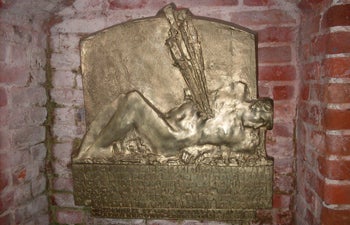Blood and Tears in Volhynia
Jared McBride, the first recipient of the Margee and Douglas Greenberg Research Fellowship, will give a public talk about his research and upcoming book on the little-known atrocities committed during World War II in the Nazi-occupied region of what is now western Ukraine.
The free Jan. 15 event underscores the expanding mission of USC Shoah Foundation — The Institute for Visual History and Education, based in USC Dornsife.
McBride, a scholar-in-residence at the institute and a visiting assistant professor of history at Columbia University, is a fellow at USC Shoah Foundation’s newly created Center for Advanced Genocide Research.
In his 4 p.m. lecture at USC’s Doheny Memorial Library (room 240), McBride will discuss how oral history, testimony and in-person interviews can be integrated with existing archival documents to re-create a micro-level history of the Holocaust in the region of Volhynia in western Ukraine. A question-and-answer session will follow his 45-minute presentation.
Shifting the gaze solely from Nazi occupation policies, McBride examines how multi-ethnic communities endured the Nazi occupation. In particular, he explains how and why individuals and groups chose to participate in or resist against violence during the occupation by looking at the Holocaust, ethnic cleansing and partisan violence in Volhynia.
The gift from the Greenbergs established the creation of the first endowed fellowship for the center, enabling one scholar to spend up to one month in residence at the center each year, while also providing financial support during the scholar’s stay.
The fellowship will enable McBride to delve into the institute’s Visual History Archive (VHA), which contains nearly 1,100 interviews from the Volhynia region. Using video testimony to augment archival documents and fieldwork, McBride has pieced together a historical account that challenges dominant good-versus-evil narratives in that region.

Plaque for victims of Volhynia massacres at Church of St. Bridget in Gdańsk, Poland.
By including the voices of local perpetrators, victims and bystanders, his project takes a bottom-up approach to piecing together a historical account that to date has been told largely through the lens of state documents and authorities.
“Being able to back things up with testimony, triangulating sources, is a really big deal — especially in these early phases, when a lot of this new history is being written for Eastern Europe,” McBride said.
McBride has already made use of the VHA for his upcoming book, ‘A Sea of Blood and Tears’: Ethnic Diversity and Mass Violence in Nazi-Occupied Volhynia, Ukraine 1941-1944.
McBride’s area of study happens to overlap with fellowship donor Douglas Greenberg, executive director of the institute from 2000-08 and now a distinguished professor of history at Rutgers University in New Jersey.
Greenberg spent two months at the institute last year as the selected Senior Institute Fellow. His work has shed light on the under-examined mass violence in Volhynia, also known as Wolyn, where the Nazi-led slaughter of Jews began years before the most recognizable events of the Holocaust. In what Greenberg refers to as the “Forgotten Holocaust,” some 1.5 million Jews in the area perished in the early 1940s.
McBride was selected by a panel of USC researchers and professors for the originality of his proposal and its potential to advance research with testimonies in the VHA.
As a scholar-in-residence, McBride will use the USC Shoah Foundation’s VHA, the world’s largest repository of video testimony from genocide survivors and witnesses. He also has access to a wealth of additional Holocaust-era resources at USC, including diaries, manuscripts, pamphlets and other documents contained in The Special Collections of USC Doheny Library, as well as the library’s more than 12,000 volumes in their Holocaust and Genocide Studies collection.
The VHA is now home to testimonies from survivors and witnesses of atrocities in Nanjing and Rwanda, as well as the Holocaust; oral histories from the Armenian Genocide will soon be integrated. The institute’s secondary education programs are used by teachers around the world and in all 50 U.S. states.
The Greenbergs will attend McBride’s lecture.
“We are so thrilled to see our intention translated into reality,” Douglas Greenberg said. “There’s something truly serendipitous in Jared’s selection since his interests so remarkably overlap with my own.”